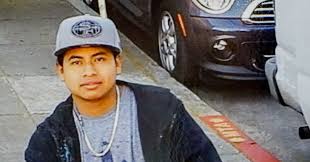On February 27, 2017, community members, faith leaders, advocates, and public officials gathered to observe the second anniversary of the slaying of Amilcar Perez-Lopez. An undocumented migrant from Guatemala, Amilcar was shot in the back six times by the San Francisco Police Department on February 26, 2015. He came to America hoping to live out the “American Dream,” earn money and help take care of his family. It’s important that the public be aware of the story of Amilcar Perez-Lopez so that there can be effective measures in bringing justice to him and his family. Furthermore, let’s celebrate the life of Amilcar and work towards changing interactions between law enforcement and the public to stop further tragic deaths such as Amilcar’s from happening.

Amilcar came to the U.S. when he was 17 years old from Guatemala. He is described by his friends as a hard worker and mild-mannered man who worked in construction and installing heating systems. Although issues of homelessness and poverty were a reality for Amilcar, he remained generous towards others. Ultimately, Amilcar—like so many of us—wanted to help his family, but his life was tragically taken at the hands of the police.
What happens when the designated law enforcers of our communities seemingly violate the community’s trust by killing a person such as Amilcar?
It’s difficult for civilians to justify shooting someone in the back of the body six times, but apparently that doesn’t apply to SFPD. The details of Amilcar’s death vary. Initially, SFPD stated that Amilcar lunged at the plain-clothed officers with a weapon, but later said that Amilcar attempted to steal a bike. It’s unclear what exactly happened during the interaction between Amilcar and SFPD, in which his life ended by gunshot wounds to the back of his body.
According to San Francisco Public Defender’s Office, “The City itself is moving painfully slow when it comes to getting answers for Amilcar’s family. After more than two years, the District Attorney has not released the results of his investigation. Charges have not been filed against a single officer. We believe justice delayed is justice denied,” said Tamara Aparton, the communications and policy assistant of the Defender’s Office.
Activism for Justice and Remembrance of Amilcar
Father Richard Smith, a faith leader, has been at the forefront in keeping Amilcar Perez-Lopez’s story alive. Over the past two years, Father Smith has helped organize press conferences, vigils, and marches in the Bay Area to recognize the tragic death of Amilcar. The efforts of his work seek out justice for Amilcar’s family and the community. In our interview with him, Father Richard Smith discussed the discrepancies between the autopsy report and SFPD statements. As an effort to bring about recognition and justice of Amilcar’s death, Father Richard Smith and other community advocates hold vigils each Wednesday outside of the Mission police station.
Human Rights and the Law
It’s essential that the community be aware of their rights when having interactions with the police. The Public Defender’s Office provided a helpful resource from the American Civil Liberties Union of Northern California which cites your rights when interacting with the police. Although this isn’t a remedy to combat decades of maladaptive behaviors by law enforcement, it is precursor for community members to fortify healthy relationships with law enforcement.
It’s been too often that we’ve heard stories such as Amilcar in which it seems justice has not prevailed. Aparton explained that it’s up to the Public Defender’s office to put the pressure on prosecutors to file charges against Amilcar’s killers. Community members, as well as public officials, should remember the humility that this young man’s life represented.
A recent conversation with Amilcar’s family reveals a sense of loss and grief. Don Juan Perez, Amilcar’s father, described his son as a hardworking young man that had a deep faith in divine power. His family members remember all the love and support that Amilcar had for his family. It’s evident that they are deeply saddened by his death and seek justice for Amilcar.
Amilcar did not die in vain because with the devotion to his family and his hope for a better tomorrow it inspires us all to live a life of gratitude. Thank you, Amilcar, for giving the people a voice of courage to stand against inhumane acts and injustices for all.
For more information or to get involved, go to justice4amilcar.org.

